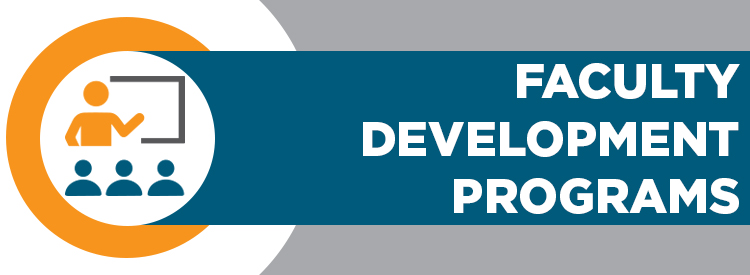Research Development provides a variety of programs to help faculty grow the skills they need to advance their research, scholarship, and/or creative activities. These include:
Learning About, Understanding, and Navigating Competitive Honors and ProposAl Development (LAUNCH PAD) is a workshop series to help early career faculty gain access to strategies, skills, and resources to compete for external funding and recognition in research, scholarship, and/or creative activities. The series is also appropriate for research scientists, postdoctoral fellows, graduate students, and other faculty who would like to improve their skills and knowledge. Each session includes a presentation and Q&A with Research Development staff and/or other subject matter experts. LAUNCH PAD’s broad range of proposal development topics includes:
- Finding funding opportunities
- Strategizing for proposal success
- Positioning for prestigious fellowships and awards
- Incorporating convergence into your research
- Finding competitiveness in supplementary documents
- Building audacious budgets for big ideas
- Broadening participation strategies to support diversity, equity, and inclusion
- Writing a compelling and responsive proposal
- Conducting proposal post-mortems and pivots
To see complete details and register for individual sessions, please visit the ORIED workshop page here.
Scholarship Agenda is an onboarding program that helps new faculty in their first two years at UT engage in multi-year planning and set goals to advance their research, scholarship, and/or creative activities. Faculty complete an intake form and receive customized guidance to jumpstart their career at UT. This process helps Research Development gain awareness and understanding of our newest faculty members’ expertise and goals to connect them with relevant resources, funding opportunities, and potential transdisciplinary collaborators. Faculty who are interested in meeting potential collaborators identified in their Scholarship Agenda should request a follow-on meeting through Coffee and Convergence.
For more information, contact Emily Mitchell (emitch15@utk.edu).
The Proposal Writing Institute (PWI) creates an opportunity for faculty to utilize expertise from the Research Development office while also benefitting from peer support to advance their research interests. Currently, the PWI’s focus is on the National Science Foundation CAREER awards. This prestigious award funds early-career tenure-track assistant professors. Participating faculty meet as a group five times during the spring semester to prepare for the NSF July deadline. Key benefits are connections to those who can help faculty succeed, a system that includes accountability check-ins, and a fresh approach to proposal development. Information on the NSF CAREER program can be found at nsf.gov.
For more information, contact Diana Moyer (dmoyer@utk.edu).
Expanding Horizons is a mid-career faculty development program that identifies, engages, and supports emerging research leaders. Over the course of an academic year, the program provides development, mentoring, and capacity-building opportunities that will build the skills and knowledge necessary for the transition to leading large-scale and/or convergent research projects that result in major scientific breakthroughs. Expanding Horizons engages newly tenured associate professors at a moment when they are ready and able to focus on developing the vision and the skills that will enable them to lead large-scale and/or convergent research projects. In addition to providing leadership perspectives on a variety of topics and opportunities to form relationships with other cohort members at a similar career stage, the program also provides access to capacity-building activities to allow participants to further develop their research leadership skillsets, or (for those who feel ready) to define and pursue the first steps toward leading a significant, convergent research project.
Expanding Horizons participants are nominated by their college’s associate dean for research. Ideal participants are recently tenured associate professors (within three years of receiving tenure). In special circumstances, and with sufficient justification, associate and full professors beyond this three-year window may be nominated.
For more information, contact Sharon Pound (spound@utk.edu).
The Dissertation to Book seminar helps junior faculty in the humanities and the qualitative social sciences to turn a dissertation into a published book. Participants receive guidance on how to prepare a successful book proposal to a university press and how to construct a compelling application, based on the book proposal, for an external fellowship such as the American Council of Learned Societies or the National Endowment for the Humanities. The seminar, which meets monthly during the spring semester, includes both reading assignments from a classic guide and writing assignments designed to produce progressively more complete drafts of a serious book proposal. At the final meeting of the seminar, the director of the UT Press provides an overview of scholarly publishing and critiques of each final draft of a book proposal.
For more information, contact Alan Rutenberg (arutenberg@utk.edu).
The faculty Fulbright fellowship provides a year or semester at a host university abroad. Research Development offers a sequence of opportunities for faculty members to receive advice on their applications for the Fulbright fellowships. The program includes: workshops devoted to the distinctive concerns and problems of the Fulbright application; a group meeting with a UT faculty member who has served on a Fulbright review panel; small writing groups that develop the Fulbright applications; matching individual applicants with a UT faculty member who has received a Fulbright for further review; and finally, reviews of final drafts.
For more information, contact Alan Rutenberg (arutenberg@utk.edu).
The Creative Residencies, Awards, Fellowships, and Trainings (CRAFT) program is dedicated to helping faculty in arts and design succeed in their professional goals. CRAFT connects faculty with funding opportunities, proposal development support, programming, regular communications, and new internal funds. CRAFT is primarily for faculty engaged in creative activities in the School of Art, School of Music, College of Architecture + Design, Theatre Department, and creative writing faculty in the English Department.
For more information, contact Hannah Schmidt (hschmidt@utk.edu).
